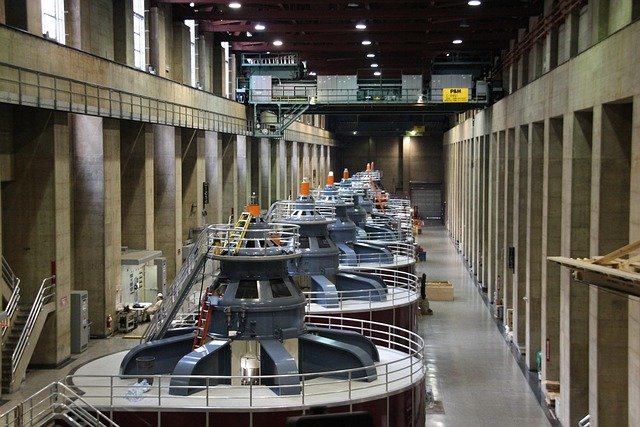Industrial Heat Pumps: Advanced Solutions for Energy Efficiency in Manufacturing
Heat pumps have emerged as transformative technology in industrial processes, offering substantial energy savings and reduced carbon footprints across manufacturing sectors. These systems, particularly high-temperature industrial variants, are revolutionizing how businesses approach thermal management in energy-intensive operations. This article explores the applications, benefits, and considerations of industrial heat pumps, with a focus on large-scale implementations and their growing adoption across European markets.

Understanding High Temperature Large Scale Heat Pumps for Industrial Use
High-temperature large-scale heat pumps represent a significant advancement in industrial heating technology. Unlike conventional heating methods that generate heat through combustion, these systems transfer thermal energy from a lower-temperature source to a higher-temperature application. Modern industrial heat pumps can deliver temperatures reaching 160°C, making them suitable for various manufacturing processes including drying, sterilization, and evaporation.
The key innovation in these systems is their ability to upgrade waste heat from industrial processes into usable high-temperature heat. This capability creates a circular energy flow within facilities, dramatically reducing primary energy consumption. For large manufacturing operations, this translates to significant cost savings and improved energy efficiency ratios often exceeding 300-400% compared to direct electrical heating.
Heat Pumps in Chemical Process Industry Applications
The chemical industry presents unique opportunities for heat pump implementation due to its energy-intensive nature and strict temperature control requirements. These specialized heat pumps serve critical functions in reaction control, distillation, and solvent recovery processes.
Chemical manufacturing facilities benefit from heat pumps through precise temperature regulation during exothermic and endothermic reactions. The technology allows for heat recovery from one process stage to another, creating integrated thermal management systems. This is particularly valuable in pharmaceutical manufacturing, where temperature stability directly affects product quality and yield rates.
Several chemical producers have reported energy savings between 30-60% after implementing high-temperature heat pump systems in distillation columns and reactor cooling circuits. The ability to maintain precise temperature profiles while reducing energy consumption makes heat pumps increasingly essential in advanced chemical processing facilities.
Air Source Heat Pump France: Leading European Adoption
France has positioned itself as a leader in industrial heat pump adoption, particularly air-source systems. The country’s commitment to decarbonization has driven significant investment in heat pump technology across its manufacturing sector. French industrial policy has prioritized electrification of heating processes, with heat pumps serving as the cornerstone of this transition.
Major French food processing companies, automotive manufacturers, and chemical producers have implemented large-scale air-source heat pumps with capacities often exceeding 1MW. These installations typically leverage France’s relatively low-carbon electricity grid to further enhance environmental benefits. The country’s experience provides valuable insights for other European nations considering similar industrial energy transitions.
French implementation models demonstrate that air-source heat pumps perform effectively even in variable climate conditions, with manufacturers reporting consistent performance throughout seasonal changes. This reliability has contributed to broader adoption across diverse industrial applications throughout the country.
Heat Pumps Prices and ROI Considerations
The initial investment for industrial heat pump systems varies significantly based on capacity, temperature requirements, and installation complexity. For medium-sized manufacturing operations, high-temperature heat pumps typically require capital investments ranging from £100,000 to £800,000 for systems delivering 100-500 kW of thermal output. Larger installations with capacities exceeding 1MW often represent investments of £1-3 million.
Despite these substantial upfront costs, the return on investment timeline has become increasingly attractive. Most industrial installations report payback periods between 2-5 years, with energy-intensive operations often achieving breakeven in under 3 years. This economic proposition improves further when carbon taxation and environmental compliance costs are factored into calculations.
| Heat Pump System Type | Typical Capacity Range | Approximate Price Range (GBP) | Typical ROI Period |
|---|---|---|---|
| Industrial Air-Source | 100-500 kW | £100,000-£350,000 | 3-5 years |
| High-Temperature Process | 200-800 kW | £250,000-£800,000 | 2-4 years |
| Large-Scale Water-Source | 500 kW-2 MW | £400,000-£2,000,000 | 3-6 years |
| Integrated Heat Recovery | 1-5 MW | £800,000-£3,000,000 | 2-5 years |
Prices, rates, or cost estimates mentioned in this article are based on the latest available information but may change over time. Independent research is advised before making financial decisions.
Applications of High Temperature Industrial Heat Pumps
High-temperature industrial heat pumps find applications across numerous manufacturing sectors. In food and beverage processing, these systems provide efficient heating for pasteurization, drying, and cleaning processes. The pulp and paper industry utilizes heat pumps for drying operations and process water heating, while textile manufacturers implement them for dyeing and finishing processes.
What makes these systems particularly valuable is their ability to recover low-grade waste heat from processes that would otherwise require cooling towers to dissipate. By converting this waste energy into usable high-temperature heat, manufacturers can simultaneously reduce both heating and cooling costs. Modern systems can effectively serve multiple temperature levels within a single facility, providing cascading thermal management across different process requirements.
The versatility of high-temperature heat pumps continues to expand as technology advances, with recent innovations enabling integration with other renewable technologies including solar thermal and biomass systems. This flexibility allows manufacturers to create hybrid energy systems tailored to specific process requirements and available energy resources.
Conclusion
Industrial heat pumps represent a mature technology with proven benefits for manufacturing operations across sectors. From high-temperature applications in chemical processing to large-scale implementations in French industry, these systems deliver substantial energy savings while supporting decarbonization efforts. While initial investment costs remain significant, the compelling economics and environmental advantages continue to drive adoption across European manufacturing. As technology advances and economies of scale improve, industrial heat pumps will likely become standard components in energy-efficient manufacturing facilities.




